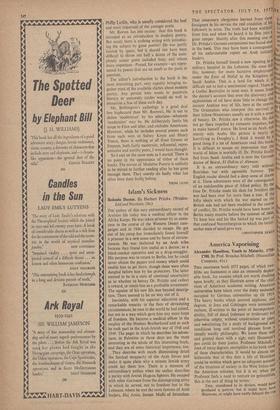Islam's Sickness
THE author of this very extraordinary record of Arabian life today was a medical officer in the Afrika Korps. He was taken prisoner by us some- time in the course of the Western Desert cam- paigns and in 1946 decided to escape. He got out of his camp but immediately found himself a prisoner in a new sense and by force of circum- stances. He was sheltered by an Arab tribe because they found him useful as a doctor, as a black-market operative and as a drug-smuggler. His purpose was to return to Berlin, but he could never obtain the papers and money which could enable him to get there, though these were often dangled before him by his protectors. The latter seemed to be in a state of continual uncertainty as to whether to betray Dr. Pritzke and collect a reward, or retain him as a profitable investment. The squalor of his new life was beyond descrip- tion. There seemed to be no way out of it.
Inevitably, with his superior education and a remarkable tenacity in the face of devastating circumstances, he rose in the world he had joined, but not in a way which gave him any more hope of freedom. He became a medical officer in the employ of the Moslem Brotherhood and as such he took part in the Arab-Jewish war of 1948 and 1949. The pages in which he describes his adven- tures in Palestine in those days are the most interesting in the whole of this interesting book, and they are of some historical importance, too.
They describe with much illuminating detail the farcical incapacity of the Arab forces and make it quite plain why a minute Jewish army could lay them low. There is a moment of extraordinary pathos when the author describes a parley with Jewish Hagana fighters. He escaped with other Germans from the disintegrating army in which he served, not to freedom but to the Lebanon, where he met the most famous of Arab leaders, Haj Amin, former Mufti of Jerusalem.
That unsavoury clergyman learned from these foreigners in his service the real condition of his followers in arms. The truth had been withheld from him and when he heard it he flew into a great temper. Shortly after this meeting one 0( Dr. Pritzke's German companions was found shot in the back. This may have been a consequence of his unfavourable report on Arab militarY leaders.
Dr. Pritzke himself found a new opening in 0 military hospital in the Lebanon. He soon left this, however, for more lucrative employment under the Emir of Hofuf in the Kingdom e Saudi Arabia. That is a land for which it iv difficult not to feel a sentimental regard. There 1so a Gothic Revivalist in most men. It seems from the doctor's account that even the disCovery and ezcploitation of oil have done little to change the 7 1 ancient Arabian way of life, here at the centre. 'e.a The Orientalists who interpret this survival to their fellow-Westerners usually see it with a sense of beauty. Dr. Pritzke saw it otherwise. He did VaY not go there impelled by romantic impulses, but ti to make himself scarce. He lived as an Arab, not r merely with Arabs. His picture is nearly as horrifying as Donghty's. I think it would be 3 good thing if a lot of Americans read this book. It is difficult to escape an impression that the world of Islam is mortally ill. Dr. Pritzke finallY fled from Saudi Arabia and is now the German doctor of Beirut, El Hakim el Aleinani. It is an extraordinary 'story told without flourishes but with agreeable humour. The English reader should feel a deep sense of shame at it. These adventures were all the consequence of an indefensible piece of Allied policy. By the time Dr. Pritzke made his dash for freedom the war had been over for more than a year. If the lofty ideals with which the war started on the British side had not been muddied in the course of conflict, Dr. Pritzke would have been home In !Hi Berlin many months before the summer of 1g46. tee To keep him and his like locked up was part of , that confused Nurembergosis to which the better. earlier state of mind gave way.
CHRISTOPHER
SYKE5






























 Previous page
Previous page